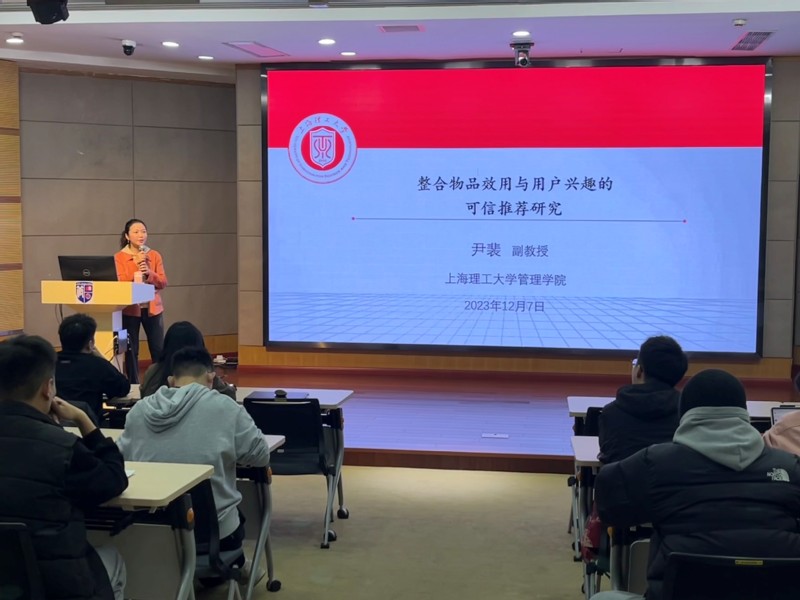On December 7th, the Hujiang Economics and Management Forum Series (78th Session) was successfully held in the second conference room on the fourth floor of the Building A of the Business School. Associate Professor Pei Yin from the Business School at the University of Shanghai for Science and Technology was invited to deliver a compelling academic report on Trustworthy Recommendation Research by Integrating Item Utility and User Interest. This presentation attracted over 40 master's and doctoral students.
At the beginning of her report, Professor Yin first gave a brief introduction to the research focus in the field of information systems, which encompasses the application of information technology in social science research and the advancement of information technology based on the findings and theories of social sciences. She then introduced the primary research paradigm in this field - Design Science, which embodies the core concept that design is both an art and a science and includes three stages: model analysis, model construction, and model evaluation. Professor Yin then turned her attention to the theme of her presentation - trustworthy recommendation research, pointing out that while the advancement of recommendation technology has brought convenience to people's lives, it has also been accompanied by issues of unreliability and distrust, attracting widespread attention. She emphasized that trustworthy recommendation involves multiple aspects such as unbiasedness, fairness, explainability, security, robustness, and privacy protection, with this report focusing primarily on the unbiasedness of recommendation systems.
Subsequently, Professor Yin delved into the existing bias issues within current recommendation systems and how to achieve trustworthy recommendations by integrating item utility and user interest. She noted that existing recommendation models usually focus only on recommending items that users are interested in, neglecting to assess the actual utility of items to users, potentially leading to algorithmic bias problems such as overconsumption or inducing addiction. Additionally, current algorithms overly rely on user history behavior, focusing on frequently encountered and highly similar interest points, which could trap users in an information cocoon. Therefore, Professor Yin's research aims to resolve the core issue of how to recommend items to users that are both in line with their interests and genuinely useful.
Lastly, Professor Yin proposed her research methods through two application examples - healthcare intervention recommendations in online health communities and task recommendations on crowdsourcing platforms. She demonstrated how to combine multi-objective learning and representation learning methods to integrate intervention efficacy and user interest, and thus recommending interventions that not only meet user preferences but also effectively improve their health status. She also explained how to use generative adversarial networks to deeply analyze various factors and their interrelationships that influence participant decisions, thereby recommending tasks to crowdsourcing participants thatalign with their interests and are within their capabilities, ensuring they are competent to successfully complete these tasks.



